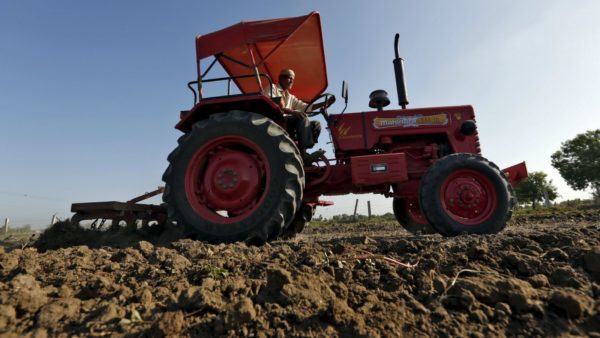A startup founder worth $15 million explains why entrepreneurs should think like farmers, not suits
Don't be afraid to get your hands dirty

WRITTEN BY; Tim Handorf Co-founder and CEO, G2 Crowd February 06, 2017 last updated January 17, 2020
My path to becoming a tech startup founder with more than $15 million in funding hasn’t been conventional. My formative years were spent living and working on my family’s farm in Gladbrook, Iowa, a town with a population of around 1,000. I didn’t attend college on either coast, develop a knack for coding in middle school, or hone my business plan in the comfort of a Silicon-Valley accelerator. While other soon-to-be entrepreneurs were dreaming up investor decks, I was herding cattle and harvesting soybeans in the heartland.
Though I have now traded agriculture for the private sector, the philosophy of farm life—and the lessons it taught me—has never left me. From an abiding work ethic to an inclination toward teamwork, the qualities that help farmers prosper prove just as powerful for startup CEOs.
These are some of the values instilled in me during my Gladbrook days, which have become integral to my success as a tech founder.
Sprint, stumble, recover
During harvest and planning seasons on the farm, 16-hour days or longer are the norm. As a child, I was expected to run, not walk, from point A to point B. All tech founders are familiar with the power of the hustle; it’s the work ethic of the sleepless nights and days of back-to-back meeting that define their companies’ success. But there’s another side to this coin, one I learned on the farm, which most founders miss: You need time to recover. No matter how busy we were, my dad always had us take Sunday off to do nothing but rest. Blocking out time to recharge is the only way to maintain an otherwise stacked schedule.
Natural time efficiency
Whenever my grandfather interviewed prospective farmhands, he’d find an excuse to have them drive somewhere. When they were walking toward their car, he’d pay attention to whether or not they took their keys out of their pocket before getting to the door. In farms and startups, time is our most valuable asset, and my grandfather needed a team who was efficient by default. Especially when growing a company, people are your biggest expense, so having employees who waste time ends up outweighing their costs.
Trust your vision
One of the trickiest jobs I helped with on the farm was moving cattle miles down the road from one pasture to the next. Controlling the flow of animal traffic demands that the small group of humans involved stand their ground—a stressful feat for a 14-year-old child going up against a 2,000-pound animal. Cattle can sense your fear, and one time my intimidation spurred a failure that I won’t forget: Because I didn’t stand my ground in front of the herd, around 20 cattle took off across the countryside, never to be found again. Whether you’re herding cattle or starting a new business, you must have faith in the big picture, even when the end goal isn’t in sight. If a CEO can’t stand their ground in the face of uncertainty, the people you need to build a long-term business will be too afraid to stick with you, too.
Do more with less
You don’t get into farming for the money: You do it because you love it. Consequently, farmers are some of the most frugal, resourceful people you’ll ever meet. My grandmother saved anything she could, from tinfoil to the plastic bags sandwich bread comes in, which she’d reuse to deliver lunches to farmhands in the field. My dad was similarly cost-conscious, and every penny he saved was reinvested back into the farm. I’ve held that mentality close over the last five years, knowing that the more resourceful I can be as a leader, the easier it will be to sustain and grow a business.
Hiring team players
To make it past my grandfather’s hiring process, candidates also had to exemplify an ability to work in a team and anticipate someone else’s needs. Farming is a group effort: When you’re driving a tractor and someone else is yards away in a combine harvester, you have to be in sync. These are the same traits founders need to identify during the hiring process (albeit over coffee or dinner, not a truck ride). When your company is only five or ten people strong, everyone needs to be okay with wearing a few different hats and taking on duties outside their official job titles when colleagues are stressed, sick, or spread too thin.
Risk tolerance
From a safety and business perspective, farming is one of the riskiest ventures you can pursue. Farmers plant their seed knowing that almost everything that happens next—weather patterns, disease, luck—is beyond their control. They do it anyway. As an entrepreneur, you have to be comfortable making similar bets. If you’re not willing to invest time and money in the ideas you’re passionate about (whether or not they yield paying customers), you’ll never realize their full potential.
Working together beats going at it alone
Our farm was a family affair. Each season we’d plant our gardens, harvest corn, and raise chickens with all of the aunts, uncles, and cousins who lived within a three-mile radius. I came to appreciate how the mundane task of picking strawberries or corn (not exactly a teenager’s idea of weekend entertainment) became more enjoyable when doing it with my relatives. Even the messy job of cleaning the chicken gizzards could be palatable when you are working with people you care about and enjoy being around. Launching a company demands plenty of hard work, and the common startup-founder mindset is to do it yourself, especially in the early years. But by building a network of passionate collaborators, you’ll both avoid burnout and have a community to celebrate your accomplishments with.
We often assume the keys to startup success are hidden in management books, co-working mixers, and tech giants’ TED Talks.
But I believe there’s plenty of wisdom to be gleaned from one of the original models of entrepreneurship: the farmer.
A Family Lifestyle Farm in St David Springs is an ideal training environment to teach values, work ethic and entrepreneurship. Programs of FAA and 4H available in Benson and St David Springs will help supplement the training.
Provide your children the gift of work ethic and intellectual freedom.
